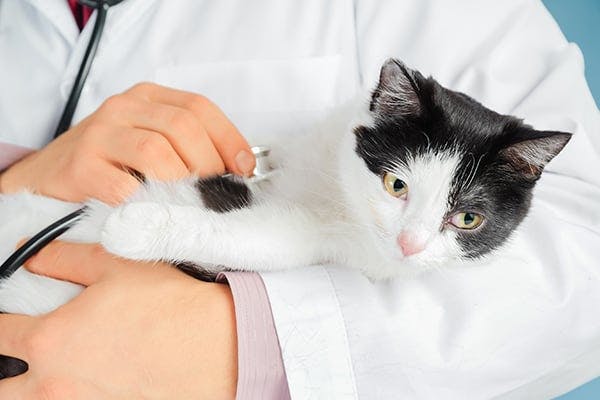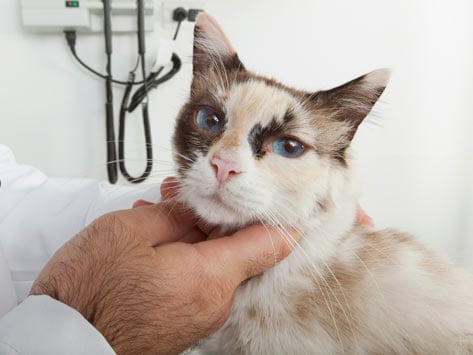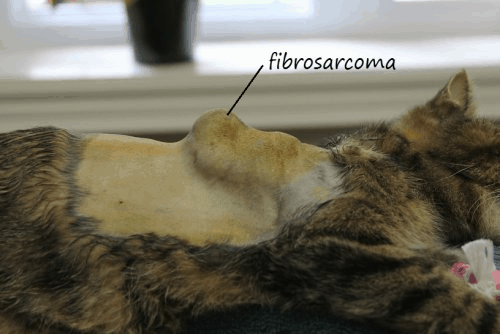fibrosarcoma in cats symptoms
A nasal fibrosarcoma will present some or all of a wide variety of symptoms. Fibrosarcoma is normally a tumor that originates in the soft tissue a result of abnormal division of fibroblast cells the cells that are most prevalent in the connective tissue of the body.

The 3 Most Common Cancers In Cats
In some rare cases a fibrosarcoma tumor originates in the bone weakening the structure of the bone and possibly.

. A fibrosarcoma is an aggressive tumour originating from the fibrous connective tissue it is the most common soft tissue tumour found in cats. In its early stages a fibrosarcoma usually does not cause any obvious signs or symptoms. Localised soft tissue swelling.
However it is more common in middle-aged cats. Vaccine-associated sarcoma in cats Symptoms. Cats that are afflicted with gingival fibrosarcomas are on average seven and a half years old but these tumors have been seen in cats from the age of six months to fifteen years.
My 2 year old cat has been diagnosed with fibrosarcoma which is a very aggressive cancer that is associated with vaccines. Lumps may or may not be painful. Some of the most common symptoms are.
Inability to walk and move. Loss of Appetite and Weight Cancerous cats frequently experience a reduction in appetite. This may be firm poorly circumscribed irregular and measure between 1-15cm.
Published rates of occurrence range from 11 000 to 110000 cats. Fibrosarcoma in both cats and dogs is commonly spotted during a physical examination. If your veterinarian comes across a lump he or she believes to be a tumor they will review your pets health history and ask questions regarding onset of symptoms as well as any out of the ordinary incidents such as accidents or illnesses A A high grade feline fibrosarcoma situated between.
It is important to note that things like weight loss could also be symptomatic of other issues. The vaccines that most frequently contain adjuvants are those for rabies and feline leukemia. Symptoms of Nasal Fibrosarcoma.
Symptoms of fibrosarcoma in cats. Fibrosarcomas are generally more common in dogs than cats although they can occur in cats of any age and breed. Symptoms of fibrosarcoma in cats Feline fibrosarcoma can occur at any age but it is most common in senior and middle-aged cats.
Some of the most common symptom include. The lump is initially very small and is usually first observed when the cat is being stroked. Signs of Fibrosarcomas in Cats Lump under the skin at the site of a vaccination Lethargy Decreased appetite.
Swollen areas of the affected body. Eventually as the cancer progresses cats with fibrosarcomas will develop these symptoms. The earlier you can receive a diagnosis the better for you and your pet.
Causes of fibrosarcoma in cats Image credit. Cats with oral fibrosarcomas may have difficulty eating and swallowing bad breath and drool. If you see it in your pet take them to a veterinarian to get a proper diagnosis.
Other common symptoms include swelling of the affected area and pain when the area is touched. This occurs specially if a tumor presses on surrounding nerves or muscles. They would have to cut her from one end to the other and from top to bottom.
Localised soft tissue swelling. Basal cell tumor skin cancer. A lump or swelling.
Pain around the affected area. Download PDF of this Fibrosarcoma in Cats article Visit the Oncology Service website Vaccine associated fibrosarcomas are tumors that arise at sites where cats have been vaccinated. Symptoms can vary depending on the location of the tumour but may include.
In most cases these signs are caused by treatable dental disease. Your pet may develop infections or open sores that take a long time to heal. Symptoms of Fibrosarcoma Fibrosarcoma manifests itself as a lump on the skin.
Fibrosarcoma in cats can present a number of symptoms. Symptoms of fibrosarcoma in cats. I was left with the decision of a very harsh surgery that would remove part of her bone and muscle and leave her in pain for at least 2 weeks.
Fibrosarcoma of the Bone in Cats. Upon a confirmed diagnosis additional tests are performed to determine the cats overall health and also to determine if the tumor cells have metastasized spread to other. These tumors may spread to the underlying bone causing pain.
Causes of fibrosarcoma in cats. Being unable to walk and move around Pain around the affected area Presence of lumps Bone fractures Swollen areas of the affected body. Pain around the affected area.
This is an increase in circumference a tumor in the skin or subcutaneous tissue. Lethargy or lack of energy Weight loss and loss of appetite If you notice anything out of the ordinary with your kitty make sure you get it checked out right away. They grow quite quickly and if left untreated can break open.
Fibrosarcoma in Cats How we can help Call 530-752-1393 to schedule an appointment with the Oncology Service. Symptoms can vary depending on the location of the tumour but may include. Fibrosarcoma in cats can present a number of symptoms.
A weakened immune system and weight loss in your felines are other symptoms of this disease. Fibrosarcomas feel rough and knotty they can hardly be moved. They are slightly more prevalent in male cats than in female cats and the cause of this is unknown as well.
However over time the following symptoms may arise. Cats diagnosed with fibrosarcoma can live for up to 3. At first the lump is very small and is noticeable when stroking the cat but it increases in size very quickly.
Cats with oral fibrosarcomas may have difficulty eating and swallowing bad breath and drool. Symptoms and Type Excess salivation Bad breath halitosis. Yelena Shander Getty Images The exact cause of.
This may or may not increase in size. Some of the most common symptoms are. Be on the lookout for unusual discharge from any of those sores or any other orifices.
Ulceration may develop in advanced cases. Up to 10 cash back Fibrosarcoma Symptoms The most common and apparent symptom of fibrosarcoma in cats and dogs is a lump which at times may be accompanied by ulceration and bleeding. In some cases however oral pain and reluctance to eat can be caused by an oral tumor.
This may be firm poorly circumscribed irregular and measure between 1-15cm. Feline fibrosarcoma can appear at any age. Inability to walk and move.
Lumps may or may not. Gender appears to play some role with male cats being seen for gingival tumors more often that female cats. Suspected Fibrosarcoma in Your Cat.
Another common sign of fibrosarcoma is a weakened immune system and regenerative properties. Swollen areas of the affected body. They are most commonly associated with the rabies vaccine.
It will increase in size very rapidly. Symptoms of a Fibrosarcoma in a Cat There are only a few indications that a cat has a fibrosarcoma.

Tumor Related To Vaccinations In Cats Petmd

Feline Injection Site Sarcoma Today S Veterinary Practice

Fibrosarcoma In Cats Causes Symptoms And Treatment

Cat Injection Site Sarcoma The Risks Treatment Prognosis Of This Deadly Tumor Our Pet S Health

Fibrosarcoma Bone Cancer In Cats Symptoms Causes Treatments Cattime

Fibrosarcoma In Cats Causes Symptoms And Treatment

Post Vaccination Sarcoma In Cats Vca Animal Hospital
/GettyImages-11673268481-ff230807a7e04e2db8e38e148edb19a5.jpg)
How To Treat Fibrosarcomas In Cats

Fibrosarcoma Bone Cancer In Cats Symptoms Causes Treatments Cattime

Feline Injection Site Sarcomas The Veterinary Nurse

Fibrosarcoma In Cats Causes Symptoms And Treatment
Fibrosarcoma In Cats Symptoms Diagnosis Treatment Innovet Pet

Managing Fibrosarcoma In Cats And Dogs Mommy S Memorandum

Fibrosarcoma Soft Tissue Sarcoma International Cat Care

Fibrosarcoma In Cats Symptoms Causes Diagnosis Treatment Recovery Management Cost
